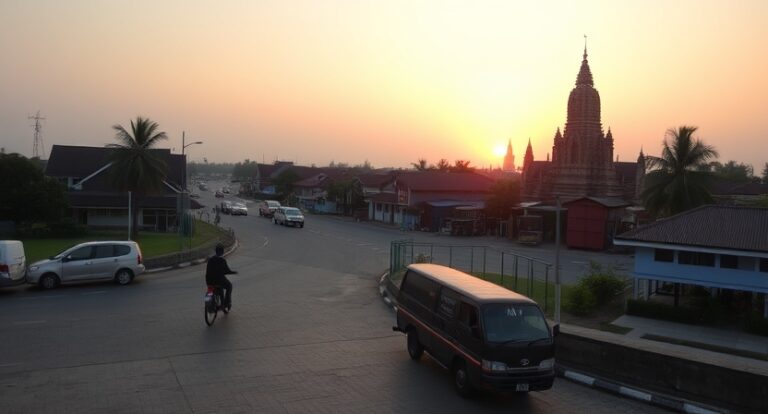Cambodia’s manufacturing sector is expanding rapidly, and with it comes the increasing demand for efficient logistics solutions to transport products both domestically and internationally. Whether you’re a manufacturer, supplier, or distributor, understanding the logistics of moving products in and out of Cambodia is crucial for success. In this blog, we’ll explore how businesses can optimize their logistics in Cambodia and why partnering with a reliable Asia agent can help streamline the process.
As Cambodia’s manufacturing sector continues to grow, the demand for efficient logistics solutions has become more critical. The country’s strategic location in Southeast Asia makes it a key player in regional trade, with easy access to neighboring countries such as Thailand, Vietnam, and China. Cambodia’s ports, highways, and infrastructure improvements have been steadily enhancing its role as a logistics hub in Asia.
However, navigating the complexities of logistics in a growing market like Cambodia can be challenging without local knowledge and expertise. This is where a trusted Asia agent can help businesses navigate the logistics landscape and ensure smooth operations.
Cambodia’s logistics sector plays a crucial role in supporting its growing manufacturing industry, but several factors impact the efficiency and effectiveness of moving goods in and out of the country. Understanding these key elements can help businesses optimize their supply chain and navigate challenges in the Cambodian market.
- Port Access and Shipping Cambodia’s ports, particularly the Phnom Penh Autonomous Port and the Sihanoukville Autonomous Port, are essential gateways for international trade. While these ports are growing in capacity, congestion and limited infrastructure can occasionally cause delays. Efficient access to these ports, including proper shipping routes and customs handling, is crucial for ensuring the timely delivery of goods.
- Road and Rail Infrastructure Cambodia’s road network is the backbone of its domestic logistics, connecting key cities and manufacturing zones. However, the roads can be underdeveloped in rural areas, which can delay transportation. Rail infrastructure is still in its early stages, limiting options for bulk transportation. Improvements are being made, but for now, road freight remains the primary mode of transport.
- Customs Procedures and Regulations Navigating customs regulations in Cambodia can be complex, with specific documentation and tariffs required for imports and exports. While the government has worked to streamline customs processes, delays are still common, particularly for businesses unfamiliar with the local regulatory environment. Partnering with a logistics provider or Asia agent who understands the customs landscape can significantly reduce potential issues.
- Warehousing and Distribution As Cambodia’s manufacturing sector grows, the demand for efficient warehousing and distribution systems increases. Warehousing facilities in Cambodia are expanding, but companies must ensure that their storage solutions align with supply chain needs. Effective inventory management and well-established distribution channels are critical to prevent delays and maintain product flow.
- Weather and Seasonal Variations Cambodia’s tropical climate, with distinct wet and dry seasons, can affect logistics operations. Heavy rains during the monsoon season can disrupt transportation, particularly on rural roads. Planning for weather-related disruptions is essential to ensure consistent delivery schedules.
- Cost of Logistics Services The cost of logistics services in Cambodia can be relatively high due to factors like limited infrastructure, reliance on road transport, and the need for local expertise in navigating the logistics landscape. Working with a trusted Asia agent can help optimize logistics costs by leveraging their knowledge and network to negotiate better rates and find cost-efficient solutions.
Navigating logistics in Cambodia can be complex, but working with a reliable Asia agent can streamline the entire process. Here’s how an Asia agent can add value to your logistics operations in Cambodia:
- Local Expertise and Network A trusted Asia agent has an in-depth understanding of Cambodia’s logistics landscape, including the best routes, reliable transportation partners, and effective strategies to minimize delays. With their local knowledge, they can help you choose the most efficient and cost-effective methods for shipping, warehousing, and customs clearance.
- Customs and Regulatory Compliance Ensuring your shipments meet Cambodia’s customs regulations is crucial to avoid delays and penalties. A reliable Asia agent can assist in preparing the necessary documentation, handling taxes, and making sure that all regulations are met. This reduces the chances of goods being held up at customs, improving the overall efficiency of your supply chain.
- Cost Efficiency Logistics can be a significant cost for businesses, especially when shipping internationally. An Asia agent can help identify cost-effective solutions, from selecting the best shipping methods to negotiating better rates with carriers and transport companies. Their local knowledge allows them to pinpoint opportunities for savings that may not be immediately obvious to companies outside Cambodia.
- Timely Deliveries Timely delivery is essential for maintaining customer satisfaction. By working with an Asia agent, companies can ensure that their goods are delivered on time, whether it’s locally within Cambodia or internationally. These agents manage the entire logistics process, from sourcing and inventory management to final delivery, helping businesses meet their timelines and commitments.
- End-to-End Solutions An experienced Asia agent offers end-to-end logistics services, which include sourcing, transportation, customs clearance, warehousing, and final delivery. This comprehensive approach saves businesses time and effort, allowing them to focus on their core operations while the logistics side is managed by experts.
Partnering with an Asia agent provides businesses with numerous advantages, particularly when it comes to managing logistics in Cambodia:
- Seamless Integration: An Asia agent integrates all aspects of your logistics operations, ensuring smooth coordination between production, warehousing, shipping, and delivery.
- Risk Reduction: With an experienced agent handling your logistics, you can minimize the risks associated with transportation delays, regulatory compliance, and customs issues.
- Improved Communication: Working with a local partner improves communication, as they understand the language, culture, and local business practices, ensuring clearer and more efficient interactions.
As Cambodia’s manufacturing industry continues to expand, the demand for reliable logistics solutions will only increase. Whether you are importing raw materials or exporting finished products, efficient logistics are essential for ensuring the success of your business. By partnering with a trusted Asia agent in Cambodia, you can streamline your supply chain, reduce costs, and ensure timely deliveries.
Logistics in Cambodia may present challenges, but with the right support, businesses can navigate these challenges and seize the opportunities that the country’s growing manufacturing sector offers. If you’re looking to expand your operations in Cambodia or improve your logistics processes, consider partnering with an experienced Asia agent to unlock the full potential of this emerging market.

